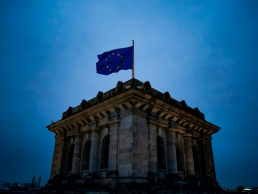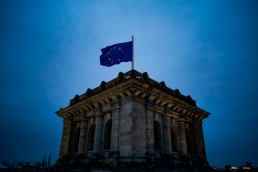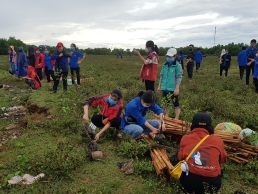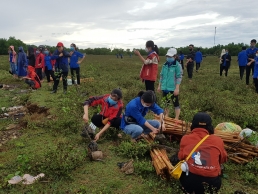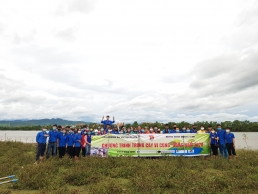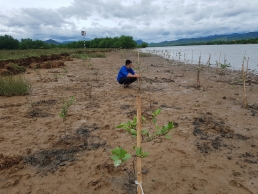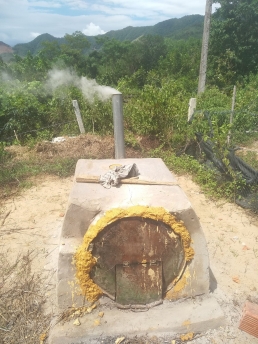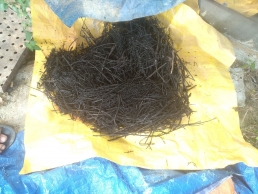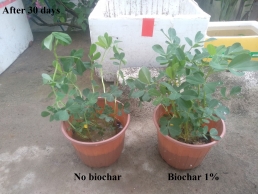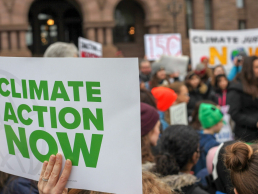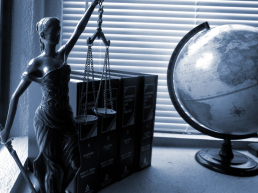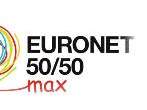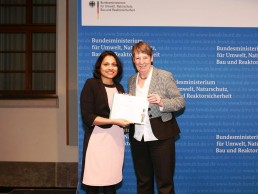Virtual study visits in the BEACON project
09. April 2021
The idea of study visits
The BEACON (Bridging European and Local Climate Action) project has been running at UfU since spring 2018 and is a project to promote climate protection through the exchange between national governments, municipalities and schools in Europe. The aim is to contribute to a stronger European integration through a bilateral and multilateral dialogue in order to ultimately create the common goal for the implementation of the Paris Climate Agreement.
As a highlight of the BEACON project, two study visits were planned, during which representatives of the partner countries Bulgaria, the Czech Republic and Romania were to be invited to Germany. A three-day program was planned with 15 educational policy multipliers each, such as speakers in teacher training, representatives from school authorities and school ministries. The study visit program should include schools and educational institutions that carry out energy-saving projects as well as energy-saving laboratories and other environmental educational institutions. The aim of the study visits was to network the actors with one another and to use the impulses of the program to discover common points of contact for work in the field of climate protection.
The first study visit with all three countries could take place as planned in autumn 2019. Invitations were made to Berlin and here the guests were able to visit various schools and hold expert talks in order to get to know energy-saving projects on site. Excursions to energy laboratories and discussions with climate protection managers and the Senate administration were also on the program and were able to provide important impulses.
The switch to digital contributions
The second study visit was to be carried out in the first half of 2020 and has been postponed repeatedly due to the pandemic. In the course of the planning it became clear that international trips could not take place during the project period and that an alternative format had to be developed. The crux of the matter is that these study visits thrive on the network character and direct exchange and cannot easily be converted into a digital format. The guiding principle of the UfU was now to provide the multipliers in the partner countries with some informative and descriptive contributions as best practice examples for local climate protection. The result were two 15-minute videos in which we worked with a professional film team:
In the film “Wind, Wagnis, (Mit)Wirkung”, the energy self-sufficient place Feldheim is presented, which we would have liked to have visited with the guests on a study visit. It is the first and so far only place in Germany that completely generates its own electricity and heat for its own use and is thus playing a pioneering role in the energy transition. Barbara Ral, Climate Protection Manager of Potsdam-Mittelmark, and Michael Knape, Mayor of Treuenbrietzen, report in the film how the interplay of favorable starting conditions, the courage of individuals to dare something new and the broad participation of citizens contributed to the success of such a pilot project what steps were necessary and what obstacles there were.
Karola Braun-Wanke and Judith Hübner from the environmental coordination office of the Berlin district of Steglitz-Zehlendorf were interviewed for the film “Vernetzt-Aktiv-Nachhaltig”. In the Botanical Garden in Berlin they report on how the coordination office came into being, what goals it is pursuing, what their work looks like in practice and what role networking plays in it. They also provide information about their educational mandate and the environmental model, which is being pursued by the city of Berlin. The establishment of the Berlin environmental coordination offices was preceded by an appraisal process on environmental education offers in the districts, in which the UfU was involved. As part of the film screenings, the UfU management explained the development process of the coordination offices.
Another UfU contribution was made for the Bulgarian partners at their request for the National Climate Protection Initiative of the Federal Environment Ministry (NKI). In collaboration with Lothar Eisenmann from ifeu (Institute for Energy and Environmental Research Heidelberg), the NKI was presented live as an example of funding opportunities for sustainable educational projects and other climate protection activities in German municipalities and schools.
The study visits were now mainly organized by the local partners and the UfU contributions were integrated into the program. The events in the Czech Republic and Bulgaria already took place as purely online workshops and the UfU contributions were received with many interested inquiries and a lively exchange of discussions. The Romanian study visit is planned for mid-April as a hybrid event: The educational policy multipliers meet on site in Romania, get to know various educational institutions in the area and the UfU is digitally connected for the contributions. Such a format is certainly a welcome change from the purely digital alternative and we keep our fingers crossed that the pandemic will not thwart the bill again!
Fourth Aarhus Workshop
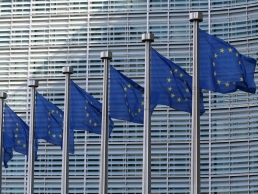
24 March 2021
On 24 March 2021, the Independent Institute for Environmental Issues e.V. – UfU – and the University of Coimbra organised the fourth digital Aarhus Workshop to discuss public participation and access to justice at European Union level. While UfU hosted and moderated the fourth Aarhus Workshop, Ms. Dr. Alexandra Aragão, who is a reknown Portuguese Professor at the Faculty of Law of the University of Coimbra, teaching environmental law, European law, risk governance and food security law, enriched the event with her well-founded and substantial presentations and contributions.
More than 20 Aarhus-interested participants from environmental associations, foundations, universities, governmental organisations as well as legal professionals took part in the fourth digital Aarhus Workshop. Most participants came from Germany, Portugal and Slovenia, those three countries, who are together holding the EU Trio Council Presidency in 2020 and 2021. On 1 January 2021, Portugal took over the EU Council Presidency from Germany and it will soon be handed over to Slovenia.
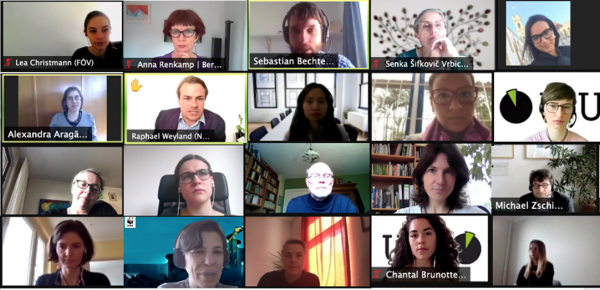
At the beginning of the Workshop, Dr. Catarina Grilo, Director of Conservation & Policy at ANP in association with WWF Portugal, delivered some insights on the Portuguese Presidency of the Council. After Catarina’s sharp observations on Portugal’s achievements in strengthening European environmental law and environmental democracy, Sebastian Bechtel, LLM, environmental democracy lawyer at ClientEarth Brussels, provided a captivating presentation on the new developments around the Amendment of the European Aarhus Regulation. The short presentation on access to justice included the advice of the Aarhus Convention Compliance Committee in ACCC/M/2017/3 of 12 February 2021 and the findings of the Committee in ACCC/C/2015/128 (European Union) of 17 March 2021. He talked about the current legislative procedure and how environmental NGOs and other stakeholder participate in it.
After a short break the main focus of the Workshop laid on two questions: “How can citizens & NGOs participate in European environmental decision-making?” and “How can electronic public participation in European environmental decision-making be strengthened?” First, Prof Dr. Alexandra Aragão gave an overview of the multifaceted public participation opportunities in Europe, e.g. the Eurobarometer, public consultations, legislative initiatives or citizen science. After the systematic presentation of central reactive and pro active participation options for European citizens and environmental NGOs by Ms. Aragão, a Panel discussion on online public consultations, who are conducted by the European Commission, followed. Part of the multi-stakeholder panel discussion were a legal scholar, two environmental NGO experts and one participation expert respectively:
- Prof. Dr. Maria Alexandra de Sousa Aragão,
- Rebecca Humphries, Senior Public Affairs Officer at WWF European Policy Office (EPO)
- Dr. Raphael Weyland, Head of Brussels Office at Nature & Bio-diversity Conservation Union (NABU) in association with BirdLife Europe, as well as
- Anna Renkamp, Senior Project Manager Bertelsmann Stiftung.
The main arguments of all panellists during the fruitful discussions are captured in the Presentation to our fourth Aarhus Workshop
After the panel discussion some time was left to discuss the pressing question where and how citizens and NGO representatives could complain if they could not participate effectively online.
Due to the limited time available to discuss the online public consultations conducted by the European Commission, UfU and the University of Coimbra agreed to prepare a discussion paper on strengthened E-participation in European environmental decision-making.
The next and final fifth Aarhus Workshop on 7. September 2021 will fall under the EU Council Presidency by Slovenia. It will be held shortly before the seventh session of the Meeting of the Parties of the Aarhus Convention (MoP 7) from 18. to 21. October 2021. If you want to join the fifth Aarhus Workshop, please register here: https://www.ufu.de/en/5-aarhus-workshop/.
All five Aarhus Workshops are part of the project “European Implementation of the Aarhus Convention in the Digital Age (EU-AarKo)” of the Independent Institute for Environmental Issues UfU e.V. This project is financially supported by the German Environment Agency (UBA) and the Federal Ministry for the Environment, Nature Conservation and Nuclear Safety within the framework of the sponsorship of environmental associations.
For more information about this project and its background, click here.
For any questions, please contact Kathleen Pauleweit: kathleen.pauleweit@ufu.de
BEACON will soon be three
18. Februar 2021
The BEACON project, in which the UfU is part of the core consortium, has now been running for almost three years. During this time, a lot has happened in the work package concerning schools. The main focus here is on creating framework conditions that allow all schools in the partner countries to carry out long-term energy-saving projects. In this context, workshops in various formats were held, Romanian, Czech and Bulgarian delegations took part in study visits to Germany, German schools exchanged ideas and experiences with schools from the partner countries, and teacher training courses on the subject of energy saving and bicycle cinema film screenings took place.
Videos of Bulgarian activities give an exemplary insight into the BEACON project:
Aarhus Workshop on access to justice at EU level
27th November Berlin
Third Aarhus Workshop on „How could access to justice at European Union level be improved?”
Almost three dozen Aarhus-interested participants from environmental associations, the legal profession and specialised lawyers took part in the third Aarhus Workshop on 17 November 2020. Sebastian Bechtel, environmental democracy lawyer for ClientEarth Brussels, introduced the Workshop with two intriguing presentations on the challenging questions: “What is wrong with access to justice in the European Union?” and “Does the Amendment to the Aarhus Regulation help?”. Two panel discussions with Aarhus experts from Germany, Portugal and Slovenia the EU countries which are currently sharing the Trio Council Presidency till the end of 2021 further elaborated on access to justice hurdles and identified concrete areas for improvement. Dr Raphael Weyland, Head of Brussels Office at Nature and Biodiversity Conservation Union (NABU); Catarina Grilo, PhD, Director of Conservation and Policy at ANP in association with WWF; and Senka Šifkovi Vrbica, legal expert at PIC Slovenia, shared their hands-on experience around accessing European and Member State courts. Dr Maria Alexandra de Sousa Aragão, Professor at University of Coimbra; Dr Vasilka Sancin, Associate Professor at University of Ljubljana and Director of Centre for International and Business Law; as well as Sebastian Bechtel, discussed with the participants how access to justice at European Union level could be further strengthened.
A joint position paper was developed during the third Aarhus Workshop. The “German Portuguese Slovenian Civil Society Declaration on Access to Justice for Citizens & NGOs at European Union Level” can be found here.
For any questions, please contact us: kathleen.pauleweit@ufu.de
The workshop is part of the project “European Implementation of the Aarhus Convention in the Digital Age (EU-AarKo)” of the Independent Institute for Environmental Issues (UfU e.V.). This project is funded by the German Environment Agency (UBA) and the Federal Ministry for the Environment, Nature Conservation and Nuclear Safety within the framework of the sponsorship of environmental associations.
For more information about this project and its background, click here.
Success stories from the small-scale climate change projects in Central Vietnam
15. October 2020
In our project on local pilot measures to raise awareness on climate change in Central Vietnam, supported by the climate fund of the German Foreign Office, UfU encourages four young Vietnamese local project teams to develop and implement their own project ideas. The four small-scale projects are advancing considerably despite the current challenges due to the pandemic. The project teams have written news to inform about the status and recent successes in their projects. Below you can read the news from the mangrove and biochar project teams.
2020 Summer Volunteer Campaign and Tree Planting Ceremony for the community in Tan Ninh commune (written by Hoang Anh Vu)
On 02.08.2020, HoChiMinh Communist Youth Union of Quang Binh University and Quang Ninh district Youth Union organized a tree planting ceremony for the local community. The event is part of a small-scale project about climate change sponsored by the German Federal Foreign Office via the Independent Institute for Environmental Issues (UfU, Berlin) and the Mientrung Institute for Scientific Research (MISR, Hue city).
Speaking at the tree planting ceremony, Mr. Hoang Anh Vu (project leader) explained that restoring the area along Kien Giang river in Tan Ninh commune with mangrove trees will create new landscape value and therefore serve local ecotourism. Realizing the value of the mangrove forest, residents will plant more trees to further increase their coverage and durability.
The event attracted the participation of about 250 volunteers, amongst them local residents, members of the HoChiMinh Communist Youth Union of Quang Binh University, and members of the Quang Ninh district Youth Union. During the event, volunteers planted 1000 mangroves along Kien Giang river in Tan Ninh commune, Quang Ninh district.
The organizers would like to thank all the volunteers who participated. Our special thanks goes to the German Federal Foreign Office, the Institute for Environmental Issues (UfU, Berlin) and the Mientrung Institute for Scientific Research (MISR, Hue city) for sponsoring this event. We hope to plant more trees in the future to further enhance the community’s resilience to climate change.
Kiln Construction and Biochar Production in Krong Klang village in Quang Tri province (written by Nguyen Van Ky Truong)
On July 22nd 2020, the project “Turning agricultural by-products into biochar to reduce pollution and increase crop yields” had officially been started by building the kiln for the production of biochar. The kiln was constructed of a 200-liter oil container with a small cap in front and a metal chimney at the back. A metal grid placed inside the container allows for ventilation. The kiln was placed on a concrete base and covered by bricks and mortar in order to protect it from severe weather impacts and heat losses.
Five types of local agricultural waste by-products were used for producing biochar, including cajuput, lemongrass, holy basil, ginger and turmeric, all in form of soft wood. It is estimated that in the project area 25 tons of these wastes are disposed to the environment monthly polluting local air and water resources.
From July 22nd to August 6th, we produced the biochar, however, the quantity produced was not as expected due to bad weather and difficulties in the combustion process in the kiln. Luckily, such initial challenge was soon over after the team has gained some experience in working with a new technology.
The team then decided to take advantage of the social distancing period to start cultivation testing with the produced biochar as manure. We started with 4 different samples of peanut plants (a soil-only sample, a 2% biochar-soil mix, a 2% biochar-7% compost-soil mix, and a soil-7% compost mix). The project team plans to continue with in total 24 samples using all 4 ratios of biochar mix in a bigger scale applied to 3 types of plants (holy basil, ginger and peanut). The growth assessment will be carried out twice a month based on plant growth criteria, including stem thickness, plant height and number of leaves.
Release Event “Civic space for participation in climate policies in Colombia, Georgia and Ukraine”
23rd November 2020
SAVE THE DATE
Join us online on November 4th, 2020 for the Release Event of our study “Civic space for participation in climate policies in Colombia, Georgia and Ukraine”
Civil society actors are key in raising the ambition of climate policies. Without civil society, there will be no socially just transition to a fossil-free world. National climate plans, including the Nationally Determined Contributions (NDCs) and long term climate strategies, benefit from diverse stakeholder engagement.
During the last months, UfU worked on a comprehensive study about opportunities of civil society (organizations) to participate in climate policies in Colombia, Georgia and Ukraine. In cooperation with BUND / Friends of the Earth Germany and Censat Agua Viva (COL), Ecoaction (UKR) and Greens Movement Georgia (GEO) the environment and conditions for climate-related participation were analyzed, such as the legal framework for participation, as well as concrete practices of participatory policy making, for example related to the recent revision of the Nationally Determined Contributions (NDCs).
We invite you to discuss with us the criteria for good practices of involving civil society in climate policy. The aim of the event is to inform about the results of the study and to bring together government and civil society actors for achieving better climate plans.
The event takes place on Wednesday, November 4 from 3 pm – 5.30 pm CET.
The detailed program will be announced in October. We will be using Zoom for the video conference, registration is required and will be possible from the end of October.
For any questions, please contact us: eva.laderick@bund.net
We look forward to seeing you online in November!
The event organization team

The event is part of the project Strengthen Civil Society for the implementation of national climate policy (ZIVIKLI) of BUND / Friends of the Earth Germany and the Independent Institute for Environmental Issues (UfU e.V.). This project is part of the International Climate Initiative. The German Federal Ministry for the Environment, Nature Conservation and Nuclear Safety promotes the initiative on the basis of a resolution of the German Federal Parliament.

For more information about this project and its background click here.
E-Learning formats regarding environmental protection in Vietnam
23rd Septemeber 2020
Interest in and needs for E-Learning formats regarding environmental protection in Vietnam
In the project DigiViet, UfU analyzed the current need for E-Learning formats dealing with environmental protection and the management of contaminated sites in Vietnam. This was supplemented by insights into some “Best-Practice” examples for E-Learning opportunities from Vietnam as well as other countries. The knowledge, collected through expert interviews and an online survey for employees from environmental agencies at the provincial level (DONREs), was summarized in the study E-Learning Opportunities regarding Environmental Protection in Vietnam: Key considerations for an E-Learning Platform about the Management of Contaminated Sites.
A summary of this study is now available in English and Vietnamese.
The DigiViet-Study came to the conclusion that in Vietnam, there is a strong interest in and need for E-Learning opportunities in general, but also in the environmental sector. The Vietnamese government supports the development of E-Learning formats and in the past years passed a comprehensive and modern legislation.
All experts who participated in our interviews and the online survey showed interest in E-Learning formats related to the management of contaminated sites.
In Vietnam, E-Learning opportunities are mostly offered by universities and schools, while the majority of all respondents identified the need for an E-Learning format about contaminated site management for the training of public agency staff.
The knowledge collected for the DigiViet-study contributes to the development of the first online-training about contaminated site management for staff from DONREs in Vietnam. The training E-Learning Opportunities regarding Environmental Protection in Vietnam is part of the project CapaViet2. While the Vietnamese version of the training is intended for public authority staff in Vietnam, the English version will be accessible for a wider audience at the UfU website.
Fore more information about this project and to see our publications on this subject click here.
Environmental lawsuit at EU level - Third digital Aarhus Workshop
18th September 2020
Invitation to the third digital Aarhus Workshop
The Department of Environmental Law & Participation invites you to a series of events on challenges of implementing the Aarhus Convention at the European level.
Series of Events 2020/2021
Challenges of Implementing the Aarhus Convention at the European Level (EU-AarKo)
When: Spring 2020 to Autumn 2021
Where: Berlin, Lisbon and Ljubljana
As part of the project “European Implementation of the Aarhus Convention in the Digital Age (EU-AarKo)”, the Independent Institute for Environmental Issues (UfU) e.V. provides during the EU Council Presidency of the four Member States Croatia, Germany, Portugal and Slovenia an open space for the European civil society, experts and practitioners in the field of environmental law to exchange their views and adopt a clear position on the lack of effective access to European courts (communication ACCC/C/2008/32 to Compliance Committee of the Aarhus Convention).
A total of five events will take place in Germany, Portugal and Slovenia. On 11 May 2020 and 30 June 2020 interested participants from Germany and Belgium took part in the first two digital workshop discussions. The next English virtual workshop will take place in November 2020. In spring 2021, another workshop may take place in Lisbon, Portugal. Before a final event in Berlin rounds off the series of events at the end of the year 2021, UfU is planning a fifth workshop in Ljubljana, Slovenia, in autumn 2021.
Third Aarhus Workshop
When: 17th November 2020, 2 pm -5 pm (CET)
How: Zoom Meeting
We would like to invite you to our third digital Aarhus Workshop, which will be held as a Zoom meeting on 17th November 2020, from 2pm to 5 pm (CET). We would particularly like to discuss with you how effective access to justice on the European Union level could look like. Among other issues, we will exchange opinions on the draft amendment to the Aarhus Regulation, which is to be published by then. The objective of the workshop is to develop a joint position paper.
The event is free of charge. Please register by sending a short e-mail with the subject heading “Yes, third workshop talk” to (larissa.donges@ufu.de) if you would like to participate. All interested participants will receive the detailed programme and registration information via e-mail.
If you have any questions regarding the topics of the workshop, please contact our dear colleague Kathleen Pauleweit (kathleen.pauleweit@ufu.de).
You will find more information about the Aarhus Convention and the Aarhus Workshops here.
Energy Saving at Schools in Europe - EURONET 50/50 MAX
04 May 2016
EURONET 50/50 MAX aimed at mobilizing energy savings in public buildings through the implementation of the 50/50 methodology in 500 schools and nearly 50 other public buildings from 13 EU countries. Based on our experience in energy saving projects in Germany, UfU developed a 9-step methodology to increase the energy awareness of the building users and to involve them actively in energy–saving actions. Achieved financial savings are to be shared equally between the building users and the local authority which covers the energy bills.
EURONET 50/50 MAX was a continuation of the very successful EURONET 50/50 project which tested the implementation of the 50/50 methodology in over 50 European schools and won the European Sustainable Energy Award 2013! Thanks to EURONET 50/50 MAX, the 50/50 network now spreads across Europe involving new schools and other public buildings.
EURONET 50/50 MAX started in April 2013 and lasted three years. The project was supported by the European Commission through the Intelligent Energy Europe (IEE) programme.
For further information check the project website: www.euronet50-50max.eu
The final guide of the project including information on the methodology and numerous practical examples from all over Europe is available in English as file and as printed brochure: almuth.tharan@ufu.de
Humboldt Fellows at UfU
14 April 2016
The Fellowship of Lawyer Lekha Sridhar from India ended in March 2016. At a ceremony at the Ministry for Environment, Nature Protection, Construction and Nuclear Safety (BMUB) the Minister Barbara Hendricks thanked the fellows for their terrific work. She also expressed her hopes that the cooperation of the fellows with German organizations on climate protection issues will continue.
Lekha Sridhar held an “International Climate Protection Fellowship” of the Humboldt Foundation and analysed the role of cooperatives in the German Energiewende at the Independent Institute for Environmental Issues. Which impulses her research results could bring for India she summarized in an UfU-Paper: Citizen Energy and Public Participation in Germany’s Energiewende: Lessons for developing countries.
Since March 2016 Thi Binh Minh Hoang from Vietnam is the new Fellow in the “International Climate Protection”- line of the Humboldt Foundation at UfU and is researching potentials of energy plants on contaminated soils.



